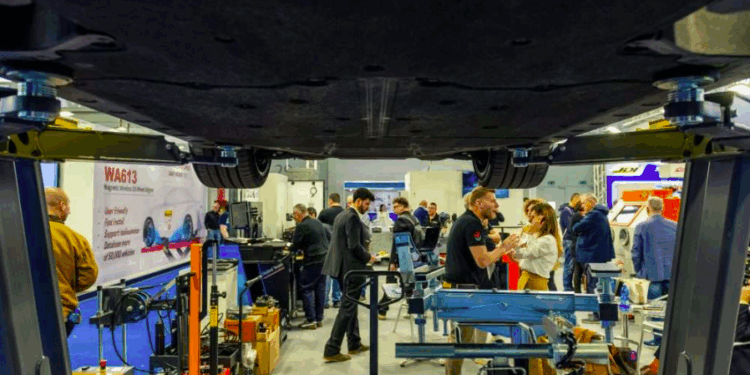Kenya is fast-tracking its automotive transformation — and it’s not doing it alone. A select delegation of Kenyan auto industry leaders recently returned from the Autopromotec 2025 exhibition in Bologna, Italy, bringing with them powerful insights and global partnerships aimed at elevating Kenya’s mobility landscape. From laser-driven garage tech to electric vehicle assembly strategies, the future of Kenya’s auto sector just got a little sharper.
In this article, we dive into the key lessons and opportunities identified by this delegation, showing how Kenya’s aftermarket, EV transition, and local manufacturing are evolving — and what it means for local drivers and businesses alike.
A High-Tech Wake-Up Call for Kenya’s Aftersales Industry
Naresh Leeka, Managing Director of Simba Corporation, found the visit to Autopromotec especially enlightening. He highlighted one standout tech — laser rust and paint removal systems — as a game-changer.
“These systems halve the time it takes to do a job, with cleaner and more precise results,” he shared.
This isn’t just about making workshops look futuristic. It’s about reducing service times, improving safety, and extending the life of vehicles — something every Kenyan car owner can appreciate. Faster service also means reduced downtime for vehicles, which is crucial for transport businesses, ride-hailing drivers, and even families who rely on a single car.
Looking for a vehicle that’s already built for durability and fuel-efficiency? Some great options like Mahindra KUV100 and Proton Saga are now available locally — and second-hand models can be found on auto24.co.ke, Kenya’s trusted second-hand vehicle marketplace.
EV Leadership and Greener Roads
Simba Corporation isn’t just innovating in garages. The company is now the leading distributor of EVs for passenger use in Kenya, partnering with MG Motors and taking a lead in offering Euro 5-compliant vehicles.
Electric vehicles are no longer a futuristic concept in Kenya — they’re here, and they’re multiplying. Whether you’re in Nairobi or Kisumu, electric buses, delivery bikes, and even private EVs are becoming more common. Automag.co.ke reports increasing visibility of charging stations across Nairobi and Mombasa, with public and private stakeholders joining forces to improve infrastructure.
Building EV Infrastructure from the Ground Up
Alex Muchilwa, Head of Legal & Policy at ROAM Electric, echoed the urgent need for accessible EV component suppliers and infrastructure. At Autopromotec, his focus was on charging systems and welding technologies — essential for rolling out Kenya’s electric mobility dreams.
“Innovation is expensive, and that’s why government support is critical,” he noted.
ROAM is taking matters into its own hands by training technicians and scaling up production. The company aims to deploy 5,000 electric motorcycles by year-end, with a strong network of charging stations and mass transit vehicles soon to follow.
Mobius Motors: Reinventing After-Sales for the Local Terrain
Local automaker Mobius Motors is best known for its rugged vehicles tailor-made for African roads. But at Autopromotec 2025, the company’s COO, John Kavila, had his sights set on improving Kenya’s aftersales ecosystem.
“Without quality tools, you can’t deliver quality service,” Kavila stressed.
He emphasized the importance of phasing out “kienyeji” or improvised repair methods, and embracing global-standard diagnostic tools and precision servicing systems. With EVs requiring less routine maintenance but more technical expertise, the company is now planning a strategic overhaul of its servicing operations.
Supply Chain Overhaul: Why Quality Components Matter
Manish Shah, Managing Director of Rubber Products Limited, walked away from the exhibition with a strong conviction — Kenya’s supply chain needs a technological upgrade.
From automation to smart quality control, Shah believes modernizing the way components are made is essential for competitiveness.
“If we want to build for the future, our systems must match global standards,” he stated.
By forming partnerships with Italian and European manufacturers, Kenyan companies like Rubber Products aim to enhance local production quality, shorten delivery timelines, and make Kenya less dependent on imports.
What This Means for Everyday Kenyan Drivers
Let’s bring it back to you — the Kenyan car owner. What do these high-level meetings and foreign exhibitions actually mean?
1. Faster, Better Service
Advanced tools will cut repair times and improve safety, especially as garages modernize. Less time in the shop means more time on the road.
2. More EV Options
Thanks to players like Simba and ROAM, you’ll soon have a wider range of electric vehicles to choose from — both new and second-hand. Some exciting options are already visible on auto24.co.ke, including hybrid and fully electric models.
3. Better Access to Genuine Parts
Modernizing the supply chain will mean higher quality parts, fewer breakdowns, and longer-lasting vehicles.
4. Skilled Technicians
As Kenya builds its EV technician base, your local mechanic might soon be trained in the latest diagnostic tools, meaning fewer errors and more reliable fixes.
What Kenya Needs to Get There
While the vision is clear, several roadblocks remain:
- Skills Gap: Kenya must train more EV technicians and upgrade automotive curricula.
- Policy Reform: Delegates called on the government to introduce tax breaks and remove duties on essential EV tools and components.
- Investment in Infrastructure: Charging stations, digital diagnostic centers, and smart workshops need robust support — both private and public.
Want to stay in the loop on these policy and industry changes? Visit autoskenya.com for regular updates on EV news, automotive innovations, and expert insights for Kenyan drivers.
Conclusion: A Future Fueled by Smart Partnerships
Kenya’s delegation didn’t just visit a car expo — they brought home a blueprint. Whether it’s laser tools reducing service time, EVs cutting carbon emissions, or locally made rubber parts improving performance, Kenya’s automotive future is being shaped by global insights and local action.
If you’re a driver, workshop owner, or investor, this is your signal to get involved. The next few years will see a massive shift in how cars are built, serviced, and driven in Kenya — and there’s room for everyone on the journey.




